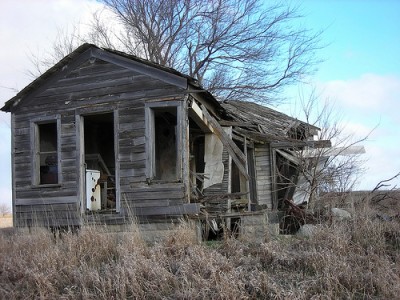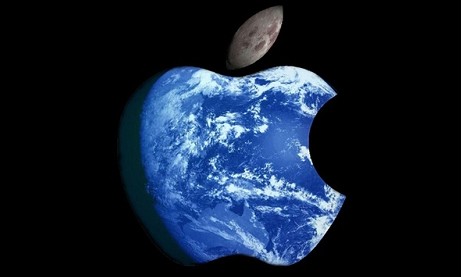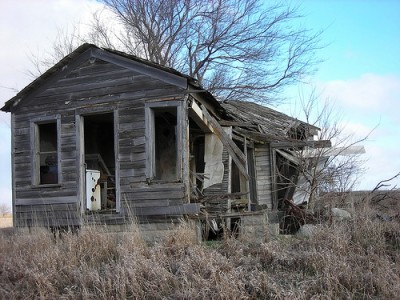 An Iowa house, no longer neededPhoto: McMorrIt’s become axiomatic that to peer deep into our reliance on fossil energy is to gaze upon human wreckage: bombed-out Baghdad slums, desolated Nigerian townships, or Appalachian communities eviscerated by the removal of mountaintops.
An Iowa house, no longer neededPhoto: McMorrIt’s become axiomatic that to peer deep into our reliance on fossil energy is to gaze upon human wreckage: bombed-out Baghdad slums, desolated Nigerian townships, or Appalachian communities eviscerated by the removal of mountaintops.
The food system has its own war zones, its own spaces of suffering and despair. Like the energy giants, food corporations generally manage these scenes off-stage, as hidden as possible from public view. Consider thousands of Florida tomato pickers living in poverty and, occasionally, slavery; or meat-packing workers, toiling in conditions so dire that Human Rights Watch was not long ago moved to issue a damning report. Or consider the more banal, everyday indignities endured by low-wage workers at fast-food outlets, institutional kitchens, and grocery-selling retail giants like Wal-Mart, ably documented by writers like Eric Schlosser, Liza Featherstone, and Barbara Ehrenreich.
This week’s New York Times Book Review shines a hard light on one of those scenes, in Walter Kirns’ compelling review of Nick Reding’s book Methland: The Death and Life of an American Small Town.
I have not gotten a copy of Reding’s book yet. If we believe Kirns, it’s a doozy. The book focuses on an Iowa town whose main legit business is a meat-packing plant. It’s chief underground activity, until recently, was the meth trade.The two are evidently intimately related. Writes Kirns:
The agricultural conglomerates that have gobbled up Oelwein and similar farm towns may feed the world, but they starve the folks who work for them, breeding a craving for synthetic stimulants that conveniently sap the appetite while enlarging the body’s capacity for toil. These offal-streaked Dickensian mills are also magnets for desperate immigrant laborers who, in some cases, blaze the smuggling trails that run up into the Corn Belt from Mexico, home to the gang lords who own the superlabs that, increasingly, dominate the meth trade.
“Vicious cycle” is not an adequate term. As Reding painstakingly presents it, the production, distribution and consumption of methamphetamine is a self-catalyzing catastrophe of Chernobylish dimensions. The rich, with their far-off, insulated lives, get richer and more detached, while the poor get high and, finally, wasted.
Reding is working in terrain mapped out by Osha Gray Davidson in his searing 1996 book Broken Heartland: The Rise of America’s Rural Ghetto, which surveyed the human wreckage of the 1980s farm crisis. Crushed between high debt loads and low crop prices, midwest farmers exited their fields by the hundreds of thousands in the 1980s. The small-town businesses that catered to them saw their profits vanish–and a social and economic crisis engulfed the Farm Belt, not unlike the ones that simultaneously gripped the great de-industrializing cities of the North. in Broken Heartland, Davidson documents the human costs: rising rates of alcoholism and child abuse; the paradox of hunger amid some of the globe’s most fertile soil.
In the years since, ownership of the Midwest’s farmland has consolidated dramatically–fewer and fewer farmers control ever larger tracts of land, with ever more expensive machines and inputs. And hog rearing and pork packing has become increasingly concentrated–with devastating effects on communities, as I saw during a 2007 trip to Iowa. The region’s towns continue their long decline. With prices of inputs like fertilizer and genetically modified seeds sky-high, a drop in corn and soy prices would almost surely bring a renewed era of misery. Even though it’s ultimately rooted in land, the Farm Belt’s economy is stunningly fragile.
The work of writers like Reding and Davidson is important, not because it tugs at the heartstrings or affirms lefty critiques of corporate-controlled agricultural. Policy makers should read it carefully. Heading into a an era of climate change, scarce oil, and intense global competition, do we really want a large chunk of our workforce deskilled and disgruntled, vulnerable to the false consolation of toxic substances? Do we really want our best farmland under the heel of a few transnational input suppliers, meatpackers, and grain traders?



